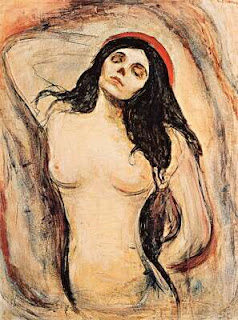Berates, gyrates, extirpates every cell in the human body.
In this age when the sound of the machine rips apart existence like the shattering of an exhaust pipe across the morning....
Extirpates:
To pull up by the roots.
To destroy totally; exterminate.
To remove by surgery.
In this age, when the soul is extirpated under the blinding surgical light of a hydrogen supernova.
In this age we seek and are blinded
In the histories of our education
And forget the babbling brook that once held sway over the stones of our soul.
So this river still flows from humble roots in elder forests
But always with mind to the blocking of being ... the being that would follow through on the following to the sea
Is hindered by the blinding white light
Of a housing development
With more men living in their homes
They cease from dwelling in the land.
They are given only into the technology of their procreation: the household with its private bedrooms
They are only placed in the cycle of an epidemic: which spreads and only knows expansion, when it should seek to know limitation and death.
They are death because their technology would only allow them to expand.
Our "modern" age is modern only in brackets:
The modern is the twisted nouveaux of ivy and silver and copper and brass patina'd reproductions of our age: there is Dionysus! The Paris subway Metro...
The metro is subsequently inbetween two places: work and home
It is in short a bar or cafe, a watering hole of archetypes
"There a Giraffe! There a zebra!"
I hear Klaus Kinsky's voice: pointing, owning and operating
And thank God he is a madman!
Then at least rest assured: that the madman will lead us!
Not some bureaucratic drone, on a crash course with a cold blue office cubicle.
Where the fuck are we?
What the fuck is our conscience!
Why the fuck are we living together?
There is a line between my living together with my woman and all of us living together on this earch. In each human soul the question of the collective is gathered together: do we dare gather together to live with each other? Like with unlike: the harmonies basically are mixed.
She is my woman long as I agree and offer myself to her: "you are my woman!"
So too with the human race!
But do we dare not to live with the other?
Or say: I live here now: and this is it at once!
Part ape, part monkey man, part young man, gentile narrator.
We were headed in the line toward ....
We were headed in the line toward ....
We are headed on the line toward ...
Conscience.
It is the scientia, the scire and scry of science, and naturally it is very wry, like the sound of a dentist's drill when it hits into the dentin for the very first time: it is dental in its eventing into the bones of your skull: "scrrrrrr!"
But Con-scientia is the sound of TWO dental drills!
First one, and then the other, like the imagined calling of penguins, out on the open Ant-Arctic snow we find Isis: "She was there in the medeau where the creek used to rise!" I mean what a fucking indictment! "My creek used to rise for you baby!" "Scrrrrr!"
Conscience is experienced directly and literally on the road: confronted by another chariot, there is Oedipal road-rage: the lack of giving way is death and the death of conscience. To meet the gaze of another driver is conscience. Those who avoid the gaze, drive without conscience. Those who walk without acknowledging the screaming engines of death all round them, thanking the drivers for their lives to be spared lack conscience as well.
"S-s-s-s-s-creaming he s-s-s-s-s-crewed her" Slithered the snake
And there we meet another of our gods down here
Yes...its the snake god
Yes we affirm in this age: not the fleeing of the gods
But the triumph of one of the mysteries over the other:
In this age the wrong do good: in this age the wrong will prosper!
What do we mean? -We are talking cold hard cash!
The know-how and the can-do.
Warmth from these words will shrivel:
But hold on now thats the meaning of the minions of death!--The night to gather us down under her motled skin of blue stones: even there beautiful in dawns bearing light.
"The dawn of conscience prevails!"
(What a bunch of hoopla! There is no way to belly roll into conscience this way!)
Conscience is unsettling: there the night watchman with his lowly flashlight and pack of cigarettes. There the janitor, the keeper of the keys to the boiler room where the psychotic act is performed in our horror movies: how do we liberate the janitor from being Jack the Ripper? Are these not the dreams that come to haunt me like so many deizens of our civilization, the killer is not "on the road" but in your very living room! Now see you are Jack the Ripper? What does that make us, behind our nation draped with national flags and bibles and dusty afternoon light coming through hundred year old windows: yeah, we know the dust: but the paint underneath still smells of lanolin! Wait a couple of thousand years! When the fires have come and gone again, when once again we know the lichen and moss on the stones of our cathedrals: then once again we will know the reaching of our babbling brook over the stones of ourselves! "Make of yourself a stone! Make yourself dark and sullen! And throw yourself in!"
Then finally will we be free again from the hectic observation of our clinical lamps in clinical hallways, and our efficient bureaucratic administration of the sciences: well fuck all that! I want to become a black stone rolling in the river down into some mysterious pool, down inside a well: a wishing well, there the water is still flowing: and the wish is: "there, I wouldn't have to go down still!" The answer to this is: "what have I ever learned or lost by dying?"
To die is to fall away, just as to live and to cherish is to gather one's conscience.
Conscience means "having soul;" and having soul means ...what? having body?
No. -Having the strength of body to prevail before the overwhelming onslaught of our age: its desire to define its living well in terms of killing the most. Having soul is not speaking, for speaking is always un-earnest. Speaking is the duplicity of the soul, but its way of salvation (more later); learning however came from the time before words and expression: the day we learned of the sunrise or the sunset over waters and did not seek or need to express this thing. If all is learning, then all is received into the abyss. Learning is not action, nor is it inaction, it is receiving.
"Son I am going to have to refer you to reading what I wrote in my latest moritoium!"
There the voice of the judge, Saturn, the senex, see he lives with us still
- a suspension of activity: a moratorium on the testing of nuclear weapons.
- a legally authorized period to delay payment of money due or the performance of some other legal obligation, as in an emergency.
- an authorized period of delay or waiting.
But Isis does not judge, she asks: "have you lived?"
And so we ask again: what is conscience?
The capacity to bear one's soul and to bear the soul of the other, the grating of teeth and the smell of dental smoke accompanied by the sound of the drill (and drills belong to the seargent-majors: you would have to come into the bunkhouse when he makes his first round and be resolved to kill the seargent major with his big fists and willingness to "throw down.").
(In Levinas, the texts are always to be read at day, and never at night, by the light of one candle, there in the secret communion with the Shekina with her tanned legs, and the touseled curls of her hair: Levinas cannot get that erotic!).
One, well that was always "unique." One candle, as if "I alone" could be standing here.
(there in the darkness I watch my careful warring sentiments clash against the hidden guardians of Deborah. There I clash to maintain this hidden screen of my libido into the aethernet.)
Modernity sought to chase the gods away. As if by some big bright gong we could clash and hear the sound that makes the gods scatter with their weary togas and bright golden laurel wreathe crowns: maybe it is the jet engine sound of a runway: as if the gods were just "runway models for this season's ancient line!"
The gods exist in those with imagination and those with the space to use it in. To call them "gods" defers the immediacy of force. It changes force into story. In short it metaphorizes the world. This is sacred magic. Now we have run from gods and ellaborate stories to sanitized hallways of scientific cells: in short we have run into "explanation."
Explanation is the god who wanders round behind the sheep man and the decaying genius in the Dolphin Hotel: it is "the horror which lurked behind our system of golden spheres without a face" (ergo... the post on the serial killer from the "boiler room" as the modern "Hermes.")
Whether there be gods or the flight of the gods, conscience holds a line of awareness between thee and me. Whether it is one simple act of compassion that makes us stop and reach down to grasp some small figment of ourselves beyond the clinical hallways of all our human futures, the struggling slime of human DNA...
At our threshold stirrs a lizard. Be it a salamander, or a proto-snake, squirming worm, or lizard king, ours is the threshold of the orange firey lizard kingdom, if we are able to encompass this instinct with conscience. Where the lizard belongs in the wheel of conscience, encounters a link in the Zoo and the whole zodiac. The soul must travel through the wheel of heavenly creatures and must encounter each creature and each manifestation, and this is its "journey" or "voyage" to meet in the synchronized gazes of lizards and grizzly bears, hawks and owls, coyotes, heroes and dogs and queens, twins and bulls, goats and lions, all the gaze that permutates all existence cast in this one shadowy and brief judgement: the judgement of life is its measure and its measure is asked in the question "have you lived" And the degree of the answer is the vehemence toward one lives into the zodiac of creatures, and greets their stares, both representing their strengths and their empty animal world poverty at the same time. But do not put back the human face: man or woman, their only stare is the gaze of the landscape, the context that shapes what happens.














